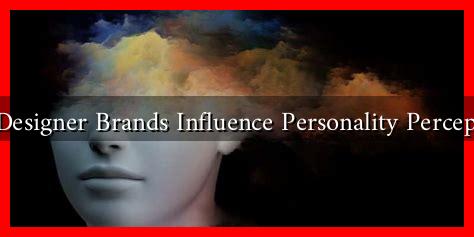-
Table of Contents
Do Designer Brands Influence Personality Perception?
In a world where first impressions are often formed in mere seconds, the clothes we wear can significantly impact how others perceive us. Designer brands, in particular, have a unique ability to shape personality perception. This article explores the intricate relationship between designer brands and personality perception, examining how luxury fashion influences social interactions, self-image, and even professional opportunities.
The Psychology of Branding
Branding is not just about logos and advertisements; it encompasses the emotions and associations that consumers attach to a brand. According to a study published in the Journal of Consumer Research, brands can evoke specific personality traits in consumers’ minds. For instance, luxury brands are often associated with traits such as sophistication, exclusivity, and success.
How Designer Brands Shape Perceptions
Designer brands can influence personality perception in several ways:
- Social Status: Wearing designer labels often signals wealth and social status. Research indicates that individuals who wear luxury brands are perceived as more competent and successful.
- Trustworthiness: A study by the University of California found that people wearing high-end brands are often viewed as more trustworthy. This perception can lead to better social and professional opportunities.
- Creativity and Individuality: Some designer brands, particularly those that emphasize unique designs, can enhance perceptions of creativity and individuality. For example, brands like Alexander McQueen are often associated with avant-garde fashion, leading to perceptions of the wearer as innovative and artistic.
Case Studies: Real-World Examples
Several case studies illustrate how designer brands influence personality perception:
- Apple: While not a traditional fashion brand, Apple has cultivated a luxury image. Users of Apple products are often perceived as tech-savvy and trendsetters, influencing their social interactions.
- Chanel: The iconic Chanel No. 5 perfume is not just a fragrance; it represents elegance and sophistication. Women who wear Chanel are often perceived as classy and refined, impacting their social dynamics.
- Gucci: In recent years, Gucci has embraced a more eclectic and bold aesthetic. This shift has led to a perception of wearers as daring and confident, appealing to a younger demographic seeking individuality.
The Role of Social Media
Social media platforms like Instagram and TikTok have amplified the influence of designer brands on personality perception. Influencers and celebrities often showcase luxury fashion, creating aspirational lifestyles that many seek to emulate. A survey by Statista revealed that 54% of consumers are influenced by social media when making fashion purchases, highlighting the power of online platforms in shaping perceptions.
Statistics and Research Findings
Several studies underscore the impact of designer brands on personality perception:
- A study published in the Journal of Experimental Psychology found that individuals wearing high-end brands were perceived as more intelligent and capable.
- Research from the University of Michigan indicated that people associate luxury brands with positive personality traits, such as confidence and ambition.
- A survey by YouGov revealed that 70% of respondents believe that wearing designer clothing can enhance one’s social standing.
Conclusion: The Power of Perception
Designer brands undeniably influence personality perception, shaping how individuals are viewed in social and professional contexts. The associations tied to luxury fashion can enhance perceptions of competence, trustworthiness, and creativity. As social media continues to play a pivotal role in fashion marketing, the impact of designer brands on personality perception is likely to grow even stronger.
Ultimately, while clothing does not define who we are, it can significantly influence how we are perceived by others. Understanding this dynamic can empower individuals to make informed choices about their fashion statements, leveraging the power of designer brands to enhance their personal and professional lives.
For further reading on the psychology of branding, you can explore resources from the American Psychological Association.

